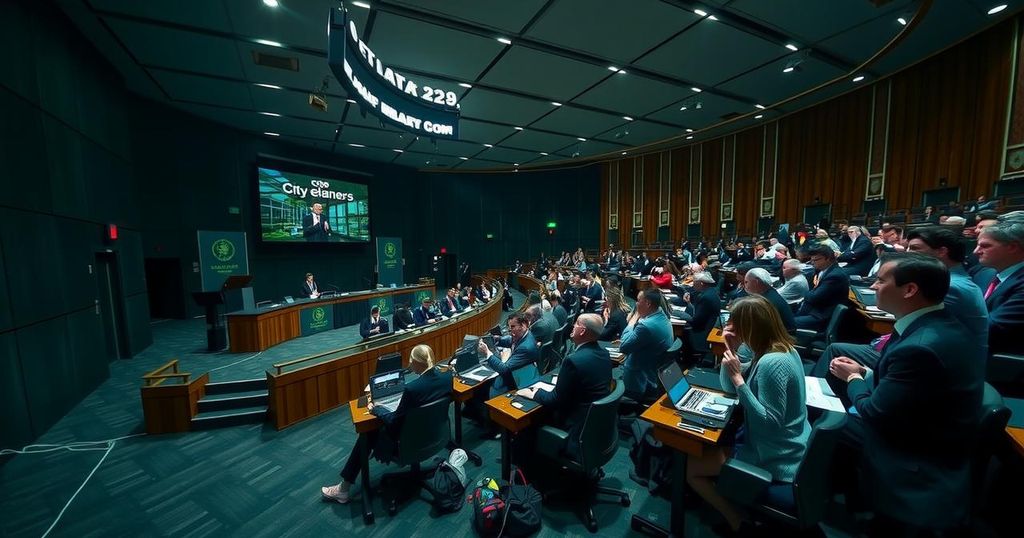COP29 concluded with a meager $300 billion climate finance commitment, far below the $1 trillion demanded by developing nations. Delegations from India and Nigeria criticized the resolution as insufficient, calling it an “optical illusion” and a “joke.” Procedural issues and the absence of fossil fuel transition discussions marred the conference experience. Developing countries seek more equitable funding mechanisms, while COP30 will need to address the credibility of global climate finance moving forward.
The recent 29th United Nations Conference of Parties on Climate Change (COP29) has been criticized for its inadequate resolution regarding the New Collective Quantified Goal (NCQG) for climate finance. India’s negotiator, Chandni Raina, and Nigeria’s delegation expressed strong opposition, deeming the resolution an “optical illusion” and a “joke,” respectively. Instead of the much-needed $1 trillion annually demanded by developing countries, only $300 billion was agreed upon, insufficient to meet the urgent needs for climate adaptation and mitigation. This underfunding highlights developed nations’ failure to honor the common but differentiated responsibilities principle outlined in the UN Framework Convention on Climate Change (UNFCCC), further deepening the divide between the needs of developing nations and the obligations of their developed counterparts.
The adoption of such a modest financial commitment raises concerns about the future commitments made at COP29, especially when past pledges—like the 2009 target of $100 billion—were not met on time and often relied on reclassified existing aid. In light of accelerating climate change impacts, developing countries are calling for a more realistic funding approach that includes public funds and grants, rather than loans with high interest rates, which would further burden developing economies. The debate intensified as developed nations suggested that emerging economies, like China, also contribute, despite significant disparities in per capita emissions compared to established contributors.
Procedural issues marred the discussions at COP29, with accusations of exclusion and improper negotiation processes leading to protests from delegations such as the Least Developed Countries (LDCs). The conference, hosted by Azerbaijan—a country heavily reliant on fossil fuel revenue—was scrutinized for failing to emphasize a transition away from fossil fuels. While US President Joe Biden and EU Commission President Ursula von der Leyen hailed the outcomes as steps toward impactful climate cooperation, many developing nations remain skeptical about the sincerity and commitment of developed countries to deliver the resources needed to address climate change adequately. COP30 in Belem, Brazil, must address these ongoing issues to establish a credible path for global climate finance.
The COP29 conference presented a significant opportunity to address global climate finance, centered around the New Collective Quantified Goal (NCQG). This goal aimed to secure necessary funding for climate mitigation and adaptation, especially for developing nations disproportionately affected by climate change. The disparity between the financial needs expressed by these nations and the modest commitments made by wealthier countries reveals a systemic issue within climate negotiations. Observers have noted that previous targets for climate finance have often been unmet or inadequately fulfilled, raising questions about the effectiveness of international climate agreements and the genuine cooperation between developed and developing nations. The conference highlighted ongoing tensions and the urgent need for transparent and sufficient funding mechanisms to address climate change comprehensively.
In conclusion, COP29 has exposed the critical inadequacies in climate finance commitments from developed nations, which fall significantly short of what is necessary to combat climate change effectively. With developing countries pushing for at least $1 trillion annually, the agreed-upon $300 billion represents a stark failure to address the severity of the climate crisis. As the world moves towards COP30, it is essential that developed nations take actionable steps to meet their funding responsibilities and ensure equitable support for those most affected by climate change, fostering genuine collaboration rather than mere rhetoric.
Original Source: www.orfonline.org






